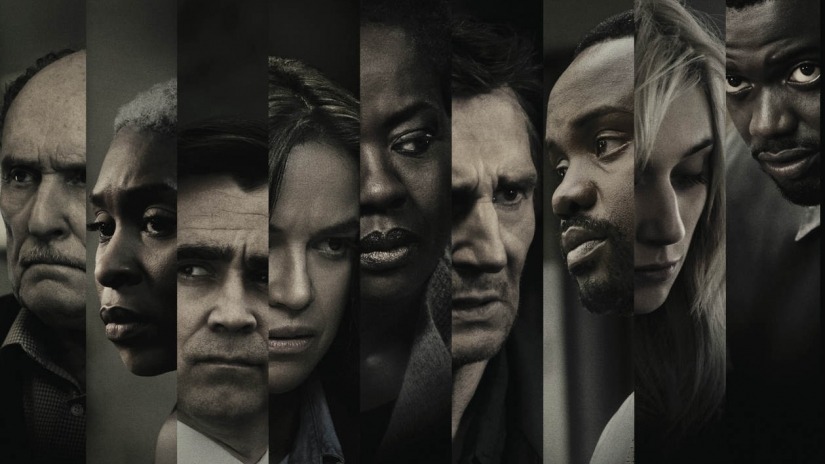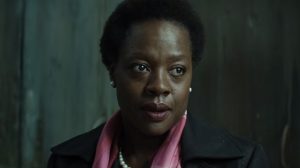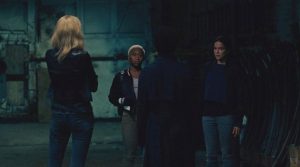Directed by Steve McQueen | Written by McQueen and Gillian Flynn, from a book by Lynda La Plante | 129 min | Netflix
We’re in good hands from the start. In the opening scenes the film jumps between the bedroom intimacies of couple Veronica and Harry Rawlings (Viola Davis and Liam Neeson) and Harry’s life of crime. It’s a heist gone wrong, with the back doors of his crew’s van blown open, bullets flying. Harry dies when the van explodes, and so do all the other men (including a blink-and-you’ll-miss-him cameo from Jon Bernthal). They leave behind wives and families, including Linda (Michelle Rodriguez) and Alice (Elizabeth Debicki), who must come to terms with their lives without the criminals they loved. It means less violence, but it also means businesses failing, the chaos encroaching. It means desperate times.
But before you start to think this is only a crime drama with a feminine perspective, let me assure you it’s that and a whole lot more.
Set in Chicago, the film takes place in the midst of a municipal alderman election—the scion of a family of crooked politicians, Jack Mulligan (Colin Farrell), is battling a gangster looking to turn a new leaf, Jamal Manning (Brian Tyree Henry), while his brother, Jatemme (Daniel Kaluuya), steadfastly wants to stay in the business. Jack’s father, Tom (Robert Duvall), is a perennial asshole with a history in this town Jack has to live down, all while trying to hang onto a gerrymandered district with an engaged African-American electorate. Yes, this is not just about thieves and their dependants, it manages to pull in conversations about gun control, class, and race. It’s about how the bad men go all the way up the ladder, and women are often left holding the bag. There’s a Wire-level political drama going on here that doesn’t overturn the thriller tropes, but runs along side them. McQueen and Flynn’s scope is huge.
It turns out Harry was stealing from the Mannings, and they figure Veronica needs to pick up the $2 million debt burned up in that van. She knew about her husband’s criminal life, but he kept it separate from their relationship. Now she’s got to dive in. Her solution: recruit the other wives and pull a heist Harry was planning but never executed. Interestingly, McQueen is less focussed on that central element of the plan typical of heist movies, and instead spends more time with his characters.
There are swaths of Widows that play like Michael Mann’s Heat with women in the key roles, it’s as good as that in places. McQueen is an art house storyteller with a European sensibility turning his attention to an American genre picture and lighting it up. His undeniable relish with this material gives it an amazing energy—you can tell he’s loving what he’s doing. Look for a long, uninterrupted shot starting at a public event in the projects that transfers to a limo, but the camera remains on the hood—we hear the conversation inside but don’t see the characters. By the time the car arrives at its destination, you’ll understand what’s really going on there.
Where Widows is let occasionally down is where McQueen’s dazzling direction meets problems in Flynn’s script. A scene where Linda tries to con an architect to get some information is badly bungled—it’s unclear whether she’s faking emotion or not, and then the moment skips into serious implausibility. Pockets of the audience I watched the film with were laughing at it, not sure whether to take it seriously. There’s a fourth member of Veronica’s team who’s brought in late, Belle (Cynthia Erivo), who we aren’t given enough time with. Erivo does well with her few scenes, but her full-on participation in all that follows requires more faith than can be reasonably mustered. And a late-arriving twist isn’t given enough oxygen to really breathe.
These interstitial hiccups keep Widows from being truly great, but it still manages to be very, very good, and full marks must go to the casting. At the forefront are Davis and Debicki, who bring a lot of grace and pain to their characters. Alice tries work as a high-end prostitute on the arm of a rich young dude, played by a surprisingly dapper Luckas Haas, and we learn a key detail of Veronica’s past that’s inexorably changed her worldview, all while she manages the grief she feels over her husband’s death by carrying her perfectly groomed Westie everywhere with her.
Despite its flaws, this is amongst the year’s essential films.










